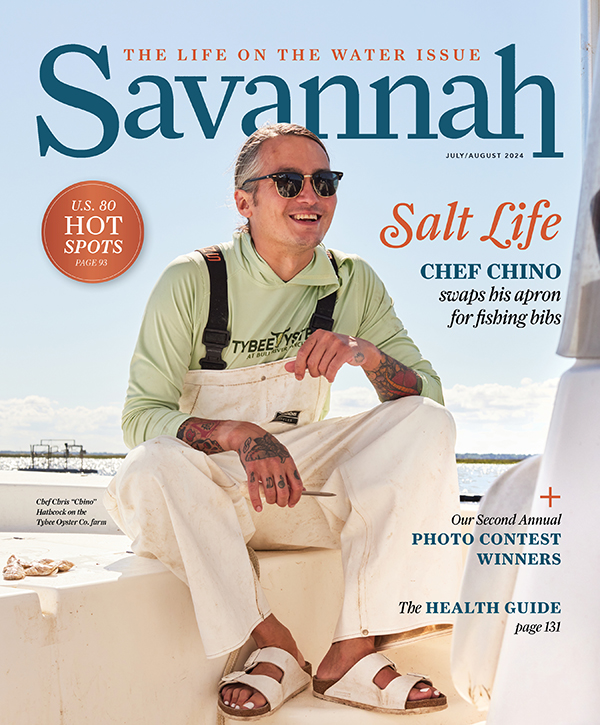Recent investments in Black-owned restaurants are stirring up the local culinary scene — and showing the need for more fire
Written by CAROLINE HATCHETT
GROWING UP, BRIDGETTE FRAZIER KNEW that if her grandmother was cooking a pot of gumbo, she’d be stuck in the kitchen all day with her, regrettably not playing with her cousins outside. Frazier chopped onions and peppers from the garden and tasted the gumbo over the course of several hours as okra, ham hocks and pigtails transformed it to proper stew. “Don’t rush no pot,” Frazier recalls her grandmother, affectionately known as Ma Daisy, telling her. “Good food takes time to come together.”
In 2015, with that immersive, elder-enforced Gullah culinary training, Frazier opened a food truck and catering company, Chef B’s Eatz, selling dishes like fried shrimp, whiting and okra, plus hamburgers and wings. And next fall, in downtown Bluffton, the chef, activist and town councilwoman will christen Ma Daisy’s Porch, a complex with a brick-and-mortar Chef B’s Eatz, bakery, retail space for Black businesses and a Gullah heritage center.

Food lies at the center of Frazier’s plans to preserve and share Gullah heritage in a region that is growing so rapidly and attracting new residents who many be unaware of her roots.
For Frazier, red rice is a reminder: Black people shaped culture here.
She’s not alone. Dottie’s Market, which opened this spring, celebrates Ericka Phillips’ grandmother’s hospitality with shrimp po’ boys and bowls of country captain and gumbo, served on fanciful china for guests who dine in at the fast-casual restaurant on Broughton Street. Before that, Todd Harris took over the kitchen at The Garage at Victory North late last year, and though the Savannah transplant never expected to cook collards or catfish, he’s doing just that, albeit with international flavors woven in. And Bernard Bennett, whose Okàn food truck sells griot and jollof rice at Starland Yard, opened his brick-and-mortar Okàn in Bluffton in June.
“Young Black people have become visible,” says Joe Randall, an influential Black chef and James Beard Foundation Hall of Fame cookbook author who moved to Savannah in the late ’90s, opened an eponymous cooking school and started the Edna Lewis Foundation. “We were here cooking all the time, but it was as if we were invisible.”
Savannah and Bluffton, no doubt, have talent to celebrate, and how the cities got to this point is part of a larger national story, one where professionals like Randall worked for decades to raise the profile of his peers, write books that integrated race and cooking, and teach America that, as he says, “Southern food is Black food.”

More recently, the Black Lives Matter movement inspired chefs to lean into their histories and advocate for more resources. Ma Daisy’s was sparked through a chance encounter between Frazier and entrepreneur Billy Watterson at a 2020 Juneteenth festival. “This unlikely friendship morphed into something that no one could have ever imagined,” says Frazier, who, with Watterson, also launched programs including Black Equity University and a Black Business Directory.
For Bennett, the convergence of Black Lives Matter and the pandemic reinforced his goal of owning a business, as it did for a growing number of Black entrepreneurs. Starting in 2021, the number of new Black businesses rose nationally by 38%. “It made it evident that people want to do their own thing and stop working for other people,” says Bennett. “For me, specifically, I don’t want anybody else telling my story.”
Locally, the region’s we’re-open-for-business approach during the pandemic served as a powerful recruitment tool for out-of-work chefs (not to mention new, diverse residents). Bennett and Harris both arrived in 2021 and quickly found jobs and restaurant partnerships.
Then, of course, there’s the Mashama effect. When Mashama Bailey opened The Grey with partner John Morisano in 2014, she proved Savannah could sustain a world-class restaurant, not to mention one run by a Black woman.
“Young Black people have become visible. We were here cooking all the time, but it was as if we were invisible.”
— Joe Randall
Last year, and nearly a decade after Bailey arrived on the scene, Bennett earned a James Beard Foundation Awards semi-finalist nod for his work on the Okàn food truck. With his sparkling new 122-seat restaurant, complete with a wood-fired hearth, Bennett now has the space and resources to dig deeper into West African-meets-Caribbean-Lowcountry cooking. A self-professed rice obsessive, the chef features Nigerian jollof rice, Haitian djon djon rice, and Caribbean rice and peas on his menu. He’s also serving curried oxtails, duck and oyster gumbo, and a Rastafarian vegan Ital stew.
“I want to break the stereotype of what African American cuisine is,” says Bennett, noting that Okàn will not serve fried chicken. “There’s nothing like Okàn for 200 miles.”
At The Garage, Harris, who’s a partner in the restaurant, makes Southern-inflected food with a pantry without boundaries and the attention to detail he learned in Michelin-starred kitchens. He stirs foie gras butter into middlins, turns macaroni and cheese into crispy croquettes and serves his fried chicken Korean style with spicy-sweet gochujang. Harris and Bennett, who coincidentally met last year at a Juneteenth event, also host a regular pop-up called Africa to Afros, in which they explore dishes from the African diaspora (things like Senegalese-style grouper and rice and Ghanaian cocoyam leaf soup) through a $125 seven-course tasting menu with wine pairings.
Drop that dinner into any city in the country, and it tastes like progress. But it does not solve Black representation in restaurants. Bennett, Harris, Frazier and Phillips don’t exactly make up a critical mass, or even an upward swing. Cheryl Day, who’s a mentor to Harris, has told him she’s worried that her Back in the Day Bakery will soon become Bull Street’s last Black business.
“When we opened The Grey in 2014, I saw more Black-owned restaurants represented in downtown Savannah. They were more mom-and-pop-type shops and that older guard of business owners,” says Bailey. “Since then, there’s been a little bit of a lull.”

Covid hit the Black restaurants hard, says Bailey, and she would like to see her adopted city offer its full-throated support for the Black community and their businesses.
Moncello Stewart, president and CEO of the Greater Savannah Black Chamber of Commerce, says the money is there. The region’s population has risen. There’s more Black tourism, and diversity and inclusion efforts mean Black businesses get a percentage of corporate conference budgets. “But we don’t get the piece we desire or should, especially in a city that’s 48% African American,” says Stewart, whose organization has programs to help restaurant owners with permitting, liquor licenses and other traditional stumbling blocks.
For the city and his own dining benefit, Stewart says Savannah needs more high-end Black restaurants à la The Grey and Good Times Jazz Club, whose menu Randall consults on. For Harris, Savannah is missing restaurants like Chicago’s Virtue, a modern Southern restaurant owned by Erick Williams, who earned a James Beard Award last year, alongside Bailey’s Best Chef win. Virtue’s team is mostly Black, its walls are lined with Black art. It’s located in a historically Black neighborhood, and the food — exceptional gizzards, dirty rice, and all — speaks directly to the Black American food history.
“I want to break the stereotype of what African American cuisine is. There’s nothing like Okàn for 200 miles.”
— Bernard Bennett
What would it take to get a Virtue-esque restaurant in Savannah? “Somebody has to give me the right amount of money,” says Harris.
How Savannah and Bluffton — both riding a boom in tourism and development — decide to invest in Black talent now will make a deep impression on their respective culinary futures. There are decades of neglect, and worse, to make up for.
Okàn and Ma Daisy’s, in particular, demonstrate development trying to do right. When describing Matt Cunningham, who built the mixed-use Bridge Collective in Bluffton and recruited the chef to open Okàn within the community, Bennett says, “It sounds cliché, but he’s down for the cause. Matt’s whole thing is putting people of color and women in positions of power. If in five years he still has equity in Okàn, he says he’s done something wrong. Matt wants management and the people who work here to own it.”
Once Ma Daisy’s build-out is complete, the property will feature three affordable housing units reserved for supervisory staff so they can afford to live in central Bluffton, save money and repair their credit. The open-air market, too, will provide retail space for Black and Gullah business owners who couldn’t otherwise afford commercial property, says Frazier, who compares the multifaceted project — with its food, cultural preservation, equity and advocacy work — to a big, long-simmering pot of gumbo.



